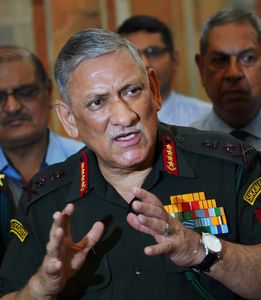The political and strategic communities in Pakistan are taken up with the evolving Bajwa doctrine, which is made of the views of the army chief General Qamar Javed Bajwa. His addresses to army commanders, and fireside chats with select media personalities have now assumed the contours of a new approach on the external and internal policies of Pakistan.
Bajwa—considered to be a hawk like his predecessor, Ashfaq Parvez Kayani—has now advocated that talks are the only solution for the country’s disputes with India. He wants a strong hand to stamp out political corruption, and he has shifted the Pakistani involvement in the Saudi-led coalition’s assault on Yemen by agreeing to provide a commander for the coalition of the willing. There have been other generals in Pakistan who had their own doctrines—Muhammad Zia-ul-Haq and Pervez Musharraf, who became presidents.
On the contrary, Indian generals have had fewer doctrinaire positions. General Deepak Kapoor, when he was Army chief, advocated Cold Start Doctrine, where the Indian army would do lightning strikes, without giving time for operational preparedness, for snatching and defending territory in short wars with Pakistan. Even though Prime Minister Narendra Modi has been given political credit for the surgical strikes in Pakistan, the concept was the brainchild of General Dalbir Singh Suhag, who was at the helm of the armed forces during Modi’s initial years.
But, the current chief, General Bipin Rawat, has perhaps been the most communicative of the men who have led the Army, and he has views on many non-military, non-strategic subjects. His doctrine of a two-front war merited much discussion—he said the Indian armed forces were ready to fight both Pakistan and China. Rawat had a far more aggressive stance on Doklam than the doves in the external affairs ministry. He was pilloried for his strong statements on the content of school curriculum in Jammu and Kashmir, and his no-compromise approach towards the stone pelters who targetted soldiers in the valley.
The state government of Mehbooba Mufti, which had asked Rawat to do his job and avoid talking on non-military subjects, has now welcomed his new statement—he said neither the Army nor the militants could solve the problem with their guns. His advocacy of dialogue as the only answer has gladdened Mufti’s People’s Democratic Party, which has been under attack from its own support base after the large scale killing of separatists by military forces, and the brutal rape and murder of an eight-year old girl in Kathua. The Rawat doctrine has many shades.
sachi@theweek.in


